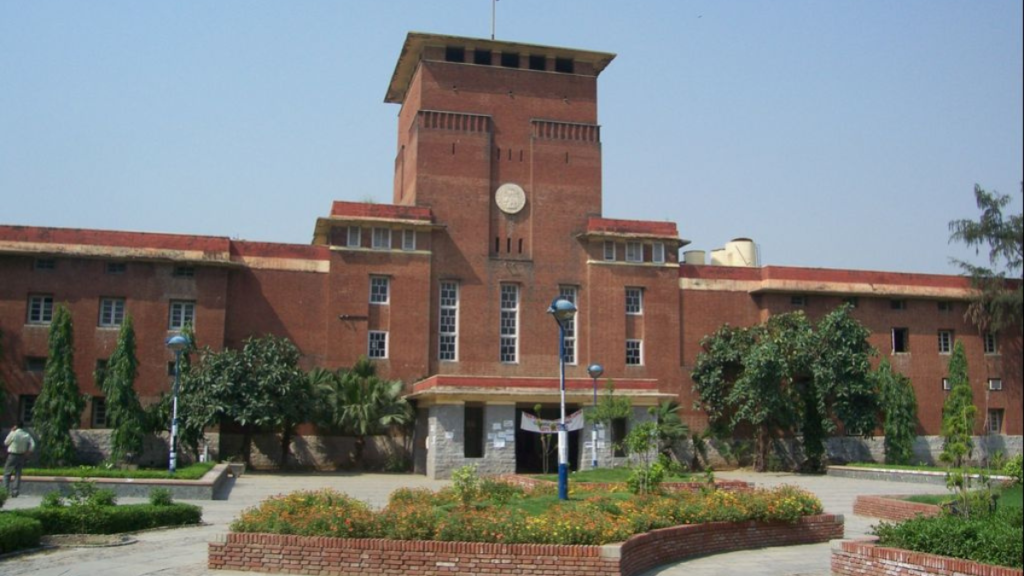DU Four-Year UG Programme is set to take full shape in 2025 as Delhi University prepares to launch the final leg of its newly structured undergraduate curriculum under the National Education Policy (NEP) 2020. This will be the first time all undergraduate streams at DU will participate in the extended four-year model, marking a significant departure from the traditional three-year degree framework.
Implemented under the Undergraduate Curriculum Framework (UGCF) 2022, the new model gives students the choice to either exit after three years or continue into the fourth year. Those who opt in can take up a research dissertation, field-based academic projects, or even try their hand at entrepreneurship. While some courses like B.El.Ed and B.Tech already follow a four-year format, this rollout brings the change to mainstream BA, BSc, and BCom degrees for the first time.
However, excitement about the new academic structure is tempered by uncertainty. Students and teachers alike have voiced concerns about clarity, preparation, and support systems. Some fear that the fast-paced changes may not allow adequate time for deep learning or genuine research experiences. Despite this, colleges are moving ahead with preparations. Faculty training has started, curricula are being drafted, and infrastructure is being upgraded to accommodate the academic demands of a fourth year.

At Hansraj College, for example, academic dean Ratnabali K recently laid out what’s expected of students who choose the dissertation track — identifying a research problem, conducting a literature review, and framing a methodology. Science students are encouraged to begin pilot studies, while those on the entrepreneurship path are asked to present business ideas, conduct market research, and design execution timelines. The eighth semester will focus on bringing these plans to life — through final reports, models, or prototypes.
Colleges like Kirori Mal and Ramjas have also taken steps to prepare students, offering optional papers in research methods and forming faculty committees to guide the transition. But logistical gaps remain. Adjusting timetables, extending lab hours, and even hiring external lab assistants are part of the challenges being discussed.
Even as DU officials assure students that systems are being strengthened, many within the university remain unconvinced. Critics like Anita Rampal, former Dean of the Faculty of Education, argue that rushing into a research-heavy curriculum without proper training and time undermines academic integrity. Faculty members from multiple colleges have echoed this concern, questioning whether expecting undergraduates to publish or innovate within a year is realistic.
Student opinion is divided. Some, like Sneha from North Campus, are unsure whether to stay for the fourth year or focus on entrance exams for postgraduate courses. Others, like Diya from the History department, are intrigued but confused, waiting on clearer information. Many feel that while optional papers like research methodology are helpful in theory, the actual delivery has often lacked depth and proper mentoring.
Still, there are students who see the new format as a valuable opportunity. Gourvi from LSR is continuing into the fourth year to strengthen her academic profile for international applications. Anoushka from Hindu College views it as a gap year with academic benefits, though she believes much depends on how well the programme is implemented.
University authorities remain hopeful. DU Registrar Vikas Gupta stated that shared infrastructure, revised teaching schedules, and continued faculty development are already underway. Some colleges, like Sri Venkateswara, are even renovating old structures to make space for additional classrooms, signaling long-term commitment.
Yet, despite these efforts, the path forward remains complex. The DU Four-Year UG Programme is an ambitious move toward modern, flexible education. But for it to succeed, the university must strike a careful balance between policy goals and practical realities — providing students not just with opportunity, but with meaningful academic experience and support.
ALSO READ
APOSS Results 2025 Declared: Over 53% Students Pass Intermediate Exams
Pahalgam Terror Attack April 22: Rajouri Schools Close During Shutdown Order
Higher education institutions leaders’ conference is carefully planned annual event: TN Raj Bhavan